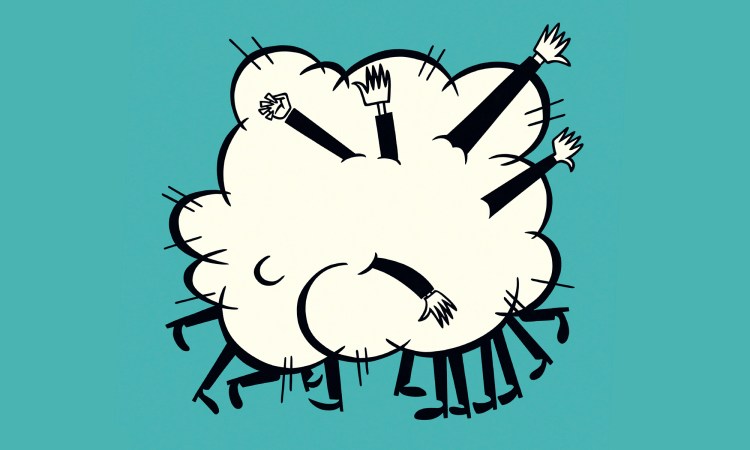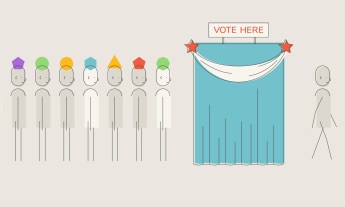
Even though some people and groups in society are setting us against each other, we can stand up to them by listening and by treating each other with respect and love, says social scientist Arthur Brooks.
Political scientists find that the US is more polarized than it has been at any time since the Civil War. And as much as we’d like to, we can’t joke the problem away. The only truly funny thing I’ve seen in our fractured political culture was a bumper sticker in the run-up to November 2016 that read “Giant Meteor 2016,” suggesting a humanity-ending catastrophe would be better than the election’s choices. As my daughter would say, “That’s dark, man.”
We need national healing. But what are we getting from many leaders in media, politics, entertainment and academia? Across the political spectrum, people in positions of influence are setting us against one another. They tell us that those who disagree with us politically are ruining our country, that ideological differences aren’t a matter of differing opinions but reflect moral turpitude, and that our side must utterly vanquish the other side even if it leaves our neighbors without a voice. We are living in a culture of contempt.
It is up to us to join together and work to subvert the culture of contempt.
What is the cure? I believe that it’s not civility or tolerance; instead, it’s love for one another and our country. It is up to us to join together and work to subvert the culture of contempt. I don’t know if this movement will be successful or popular, as it runs so counter to the prevailing currents. But if you’d like to try to renew our nation, here are five simple rules to remember:
Rule 1. Refuse to be used by the powerful.
Most people don’t believe they’re being used by others. Why not? Think for a second about a manipulative leader — someone you know who uses people’s hatred for their own goals of money, power or fame. Got an image in your head? You’re probably thinking of someone you dislike, someone who might use others — but someone who can’t use you because you already see through them.
However, that’s not quite right. The accurate image of a powerful manipulator is someone on your side of the debate: a media figure who always affirms your views, a politician who always says what you think, or a professor who never challenges your biases. They declare the other side is terrible, irredeemable, unintelligent or anything else that expresses contempt — and they say you should think these things as well.
As satisfying as it is to hear these things, remember: These people do not serve your interests. They want to get you fired up, because when they do, they make money, win elections, or get more famous and powerful.
Just as a fire requires oxygen, the culture of contempt is sustained by polarization and separation.
To begin with, make an inventory of these figures in your life. Then, set your strategy for rebellion, which comes in one of two forms. The first is passive: tuning out manipulators. This is most appropriate for those with whom you don’t have any direct contact — a columnist or TV host. Stop watching the show or reading the column. Ask: “Will I miss something I don’t already think or know? Or am I just scratching an itch?” Unless the person is teaching you something or expanding your worldview or moral outlook, you are being used.
The second form is active — and harder: Stand up to people on your own side who trash people on the other side. It’s never easy to stand up to our own friends, but contempt is destructive, no matter who expresses it. Will you get invited to fewer parties, have fewer followers on social media, and hear less gossip? Probably. But you know it’s the right thing to do, and you will feel great.
Rule 2. Escape your bubble.
Just as a fire requires oxygen, the culture of contempt is sustained by polarization and separation. It is easy to express contempt for those with whom we disagree when we view them as “them” or never see them at all. Contempt is much harder to express when we see one another as fellow human beings, as “us.”
A simple way to start practicing this rule is by going to unfamiliar ideological territory. If you’re a conservative, listen to NPR a couple of mornings a week instead of watching FOX & Friends, or include a few pieces from the Atlantic in your articles to read. If you’re liberal, from time to time put down the Washington Post and read the Wall Street Journal editorial page, or add a few conservative podcasts to your rotation.
A more serious approach involves your relationships. Ask yourself: “Do I go places where my ideas are in the minority? Do I hear diverse viewpoints? Do I have personal friendships with people who do not share my politics?” Make an ideologically wider social circle your project for this year.
Contempt is always harmful for the contemptor. While it may feel good in the moment, it is the fast road to unhappiness.
Escaping the bubble also means — to mix metaphors — breaking out of the shackles of identity. In America today, many people primarily identify themselves in strong demographic terms, including political categories. While this identification can create a sense of belonging and power in numbers, mostly it emphasizes our differences. That’s a self-defeating proposition if we want a unified country that can cope with our shared challenges.
One of my great moral heroes is the Dalai Lama, who understands the balance between common story and individual identity better than anyone I’ve ever met. Here are his words: “I’m Tibetan, I’m Buddhist, and I’m the Dalai Lama, but if I emphasize these differences, it sets me apart and raises barriers with other people. What we need to do is to pay more attention to the ways in which we are the same as other people.”
Rule 3. Treat others with love and respect, even when it’s difficult.
Never treat others with contempt, even if you believe they deserve it. First, your contempt makes persuasion impossible, because no one has ever been insulted into agreement. Second, you may be wrong to assume that certain people are beyond reason. There are many examples of people forming unlikely bonds precisely because they didn’t treat each other with contempt. Finally, contempt is always harmful for the contemptor. While it may feel good in the moment, it is the fast road to unhappiness.
“How can I avoid contempt for someone who is immoral?” I hear that question every day. In virtually every case, those whom you consider immoral are not when it comes to principles you care about, like compassion and fairness. They may have different moral taste buds on, say, loyalty, purity or authority, but that’s all right. Focus on what is most important to both of you.
As in politics and economics, competition — bounded by rule of law and morality — brings excellence.
What about when you are the one treated with contempt? See it not as a threat but as an opportunity to change at least one heart — your own. Respond with warm-heartedness and good humor. You are guaranteed to be happier. Others might see it, and if it affects them at all, it will be to the good.
One last word on this topic. You might be feeling a little guilty right now. If you’ve been connected to political discussion over the last few years, you may have said contemptuous things about — or to — others. I have. What should we do about that? It’s time to apologize. Perhaps say, “I know we don’t agree, but you are more important to me than our disagreement. Sorry I let our disagreement mess up our relationship.”
Rule 4. Be part of a healthy competition of ideas.
If you did nothing more than glance at the title of my book — Love Your Enemies — you may be tempted to conclude that my main argument is to avoid disagreement by disagreeing less. But I believe disagreement is good because competition is good. As in politics and economics, competition — bounded by rule of law and morality — brings excellence.
In the world of ideas, competition is called “disagreement.” Disagreement helps us innovate, improve, correct and find the truth. Of course, disagreement — like free markets and free elections — requires proper behavior to function. No one thinks that hacking a voting machine is part of a healthy democracy, nor that cronyism and corruption are part of the way free enterprise is supposed to work. Similarly, anything that makes open, respectful disagreement difficult or impossible is incompatible with a true competition of ideas.
Do a politics cleanse. You’ll find politics is like a daytime soap opera, in that you can skip a couple of weeks without losing track of the plot.
The single biggest way a subversive can change America is not by disagreeing less, but by disagreeing better — engaging in earnest debate while still treating everyone with love and respect.
Rule 5. Disconnect from unproductive debates.
My guess is that you, like me, are superconnected to the world of ideas. That’s great, but it can also be problematic. For most of my life, I thought if I wanted to have a positive impact on the world, I had to be as informed as possible. In my 20s, when I was a French horn player in Barcelona with no interest in public policy, I decided to subscribe to the Economist. I simply felt that I needed more information to be a better citizen.
But these days, is more information better for your ability to be a constructive and happy citizen? Click on the app for your favorite newspaper and you will be enmeshed in a complicated algorithm feeding you stories curated for your tastes and designed to keep you reading as long as possible.
The solution is selectivity and rationing. Get rid of curated social media feeds. Unfollow public figures who foment contempt. Want to get really radical? Stop talking and thinking about politics for a little while. Do a politics cleanse. For two weeks — maybe during your next vacation — resolve not to read, watch or listen to anything about politics. Don’t discuss politics with anyone. This will be hard to do but not impossible.
Go find someone with whom you disagree; listen thoughtfully; and treat them with respect and love.
Does the prospect of a cleanse worry you? Here’s the truth: If you stop talking about politics for a couple of weeks, nothing will change — except you might get invited to more parties because you don’t always talk about politics. Afterward, with more perspective, you’ll return to current events. I predict you’ll find politics is like a daytime soap opera, in that you can skip a couple of weeks without losing track of the plot. And, like any reformed addict, you’ll see how much time you were wasting and how much you were neglecting the people and things you truly love.
Those are my five rules. Want it even simpler? Go find someone with whom you disagree; listen thoughtfully; and treat them with respect and love. Think of it like missionary work. In general, missionaries are ordinary people with a vision for a better world that they want to share. They can face opposition. In places like China, they are in physical danger, and even here in the US, most people see them at the door and whisper, “Pretend we’re not home!” But some people open the door, and then some of those listen and say, “I want that.” That’s how proselytizing is supposed to work. Missionaries supply others with a new vision, delivered with love and kindness, and then give them the tools to make that vision a reality.
Near my home is a Catholic retreat house where my wife and I teach marriage-preparation classes for engaged couples. In the chapel, there is a sign posted over the door — not the door coming in but rather the one going out into the parking lot. It is written for people to look at as they’re leaving. It says, “You are now entering mission territory.”
The message is profound: You are here because you have found what is good and true, but you’re going to go out where people haven’t yet found what you’ve discovered. You have the privilege of sharing it — with joy, confidence and love. That should be a message to all of us who want to make the US and the world better.
Excerpted with permission from the new book Love Your Enemies: How Decent People Can Save America from the Culture of Contempt by Arthur Brooks. Published by Broadside Books, an imprint of HarperCollins Publishers. Copyright © 2019 by the American Enterprise Institute.
Watch Arthur Brooks’s TED talk:











